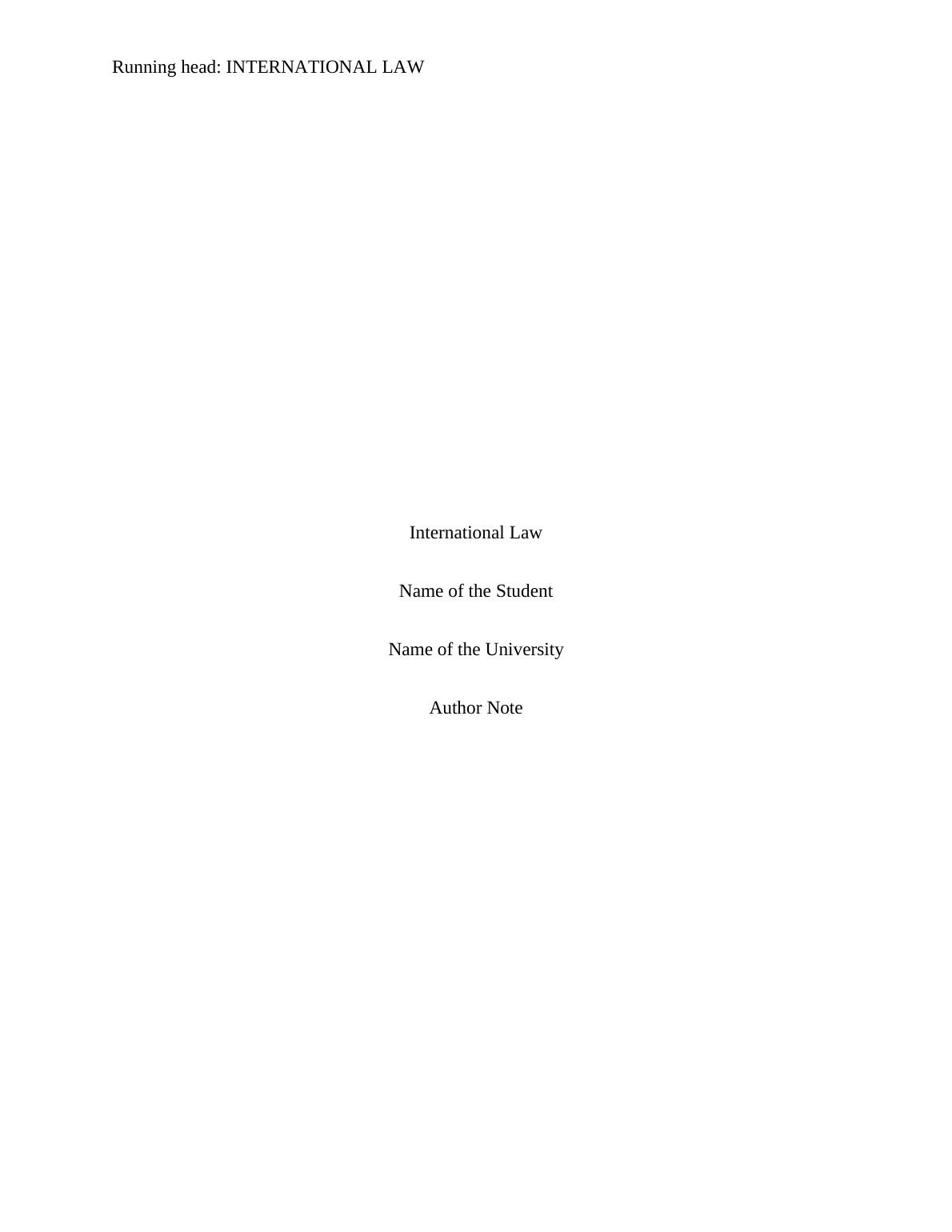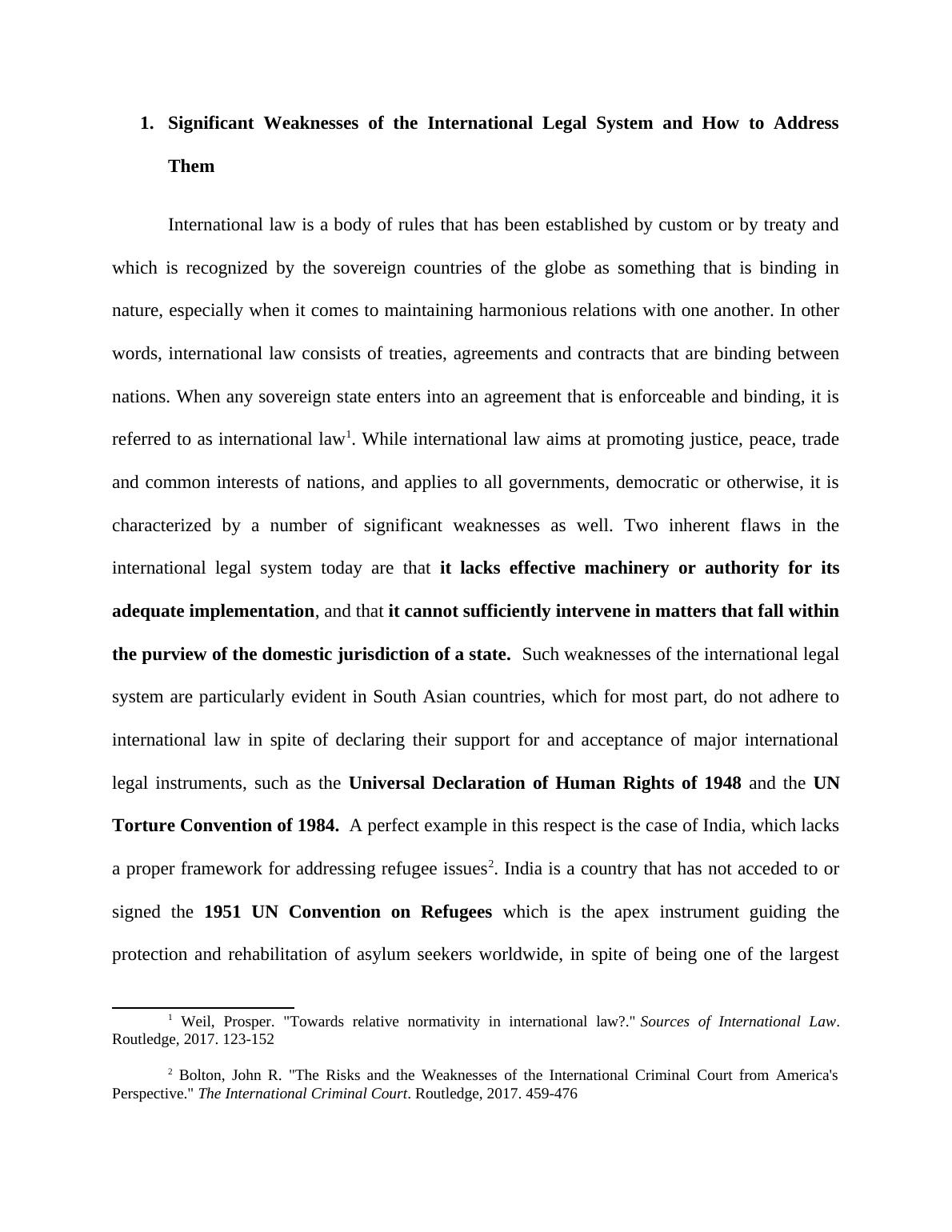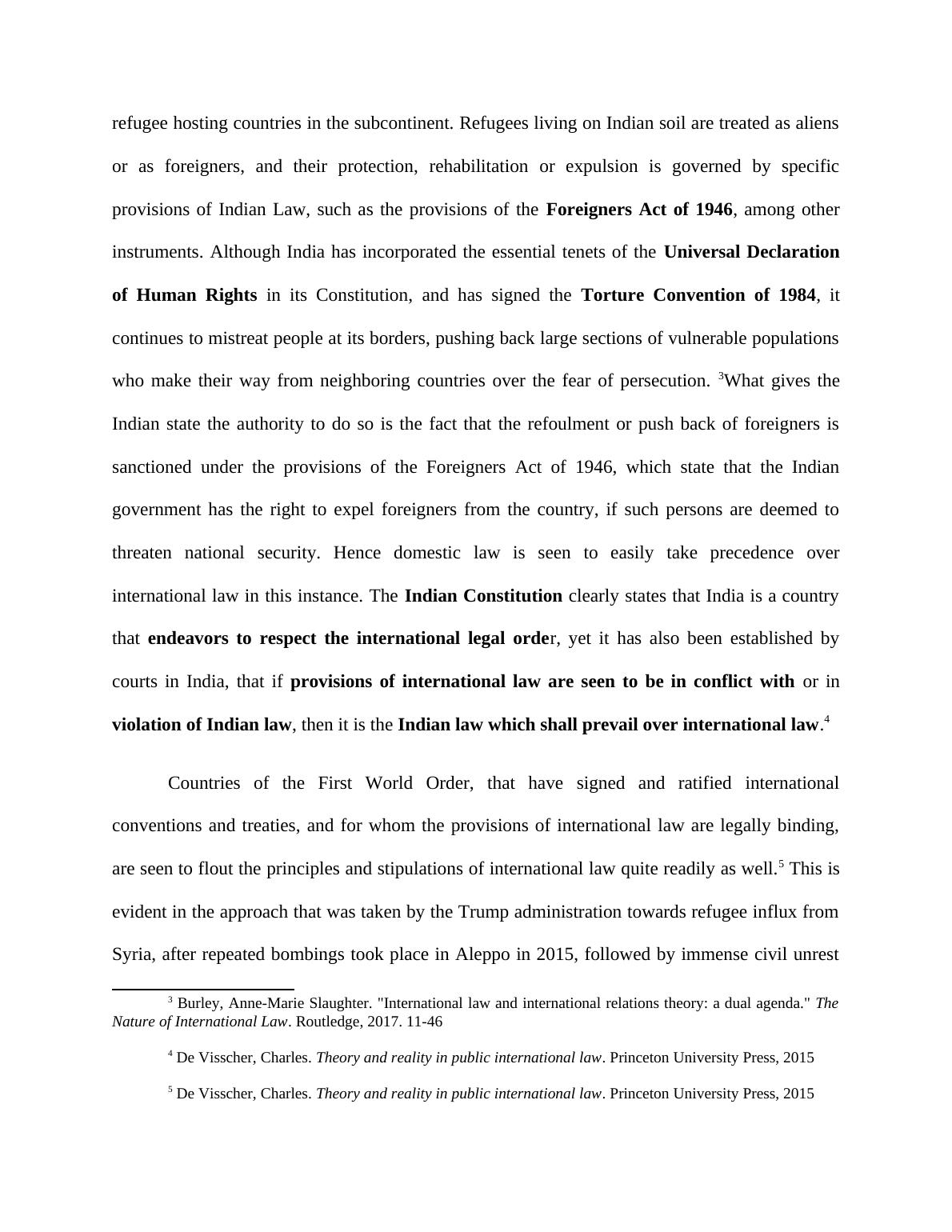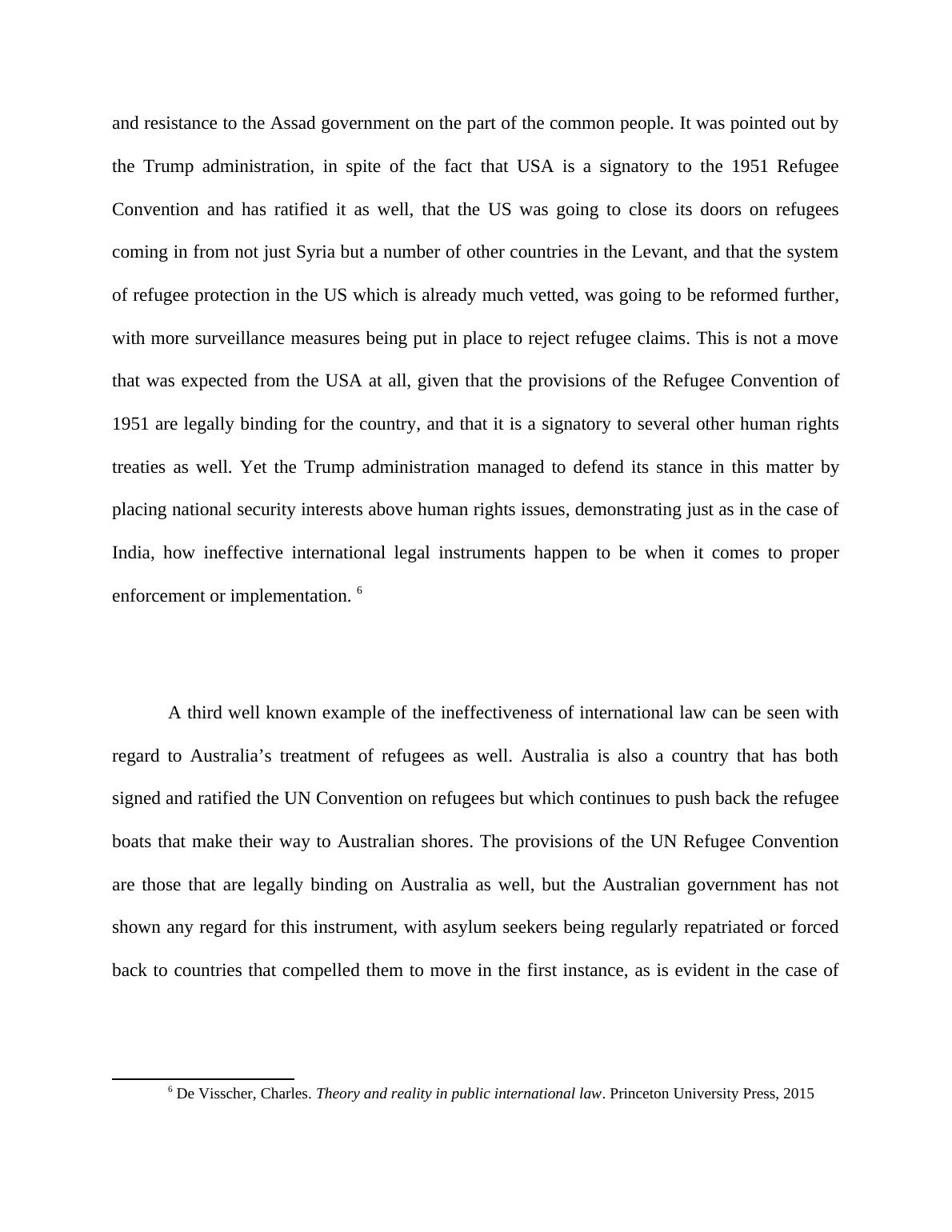How to Address Them
Added on 2023-04-23
14 Pages4265 Words223 Views
Running head: INTERNATIONAL LAW
International Law
Name of the Student
Name of the University
Author Note
International Law
Name of the Student
Name of the University
Author Note

1. Significant Weaknesses of the International Legal System and How to Address
Them
International law is a body of rules that has been established by custom or by treaty and
which is recognized by the sovereign countries of the globe as something that is binding in
nature, especially when it comes to maintaining harmonious relations with one another. In other
words, international law consists of treaties, agreements and contracts that are binding between
nations. When any sovereign state enters into an agreement that is enforceable and binding, it is
referred to as international law1. While international law aims at promoting justice, peace, trade
and common interests of nations, and applies to all governments, democratic or otherwise, it is
characterized by a number of significant weaknesses as well. Two inherent flaws in the
international legal system today are that it lacks effective machinery or authority for its
adequate implementation, and that it cannot sufficiently intervene in matters that fall within
the purview of the domestic jurisdiction of a state. Such weaknesses of the international legal
system are particularly evident in South Asian countries, which for most part, do not adhere to
international law in spite of declaring their support for and acceptance of major international
legal instruments, such as the Universal Declaration of Human Rights of 1948 and the UN
Torture Convention of 1984. A perfect example in this respect is the case of India, which lacks
a proper framework for addressing refugee issues2. India is a country that has not acceded to or
signed the 1951 UN Convention on Refugees which is the apex instrument guiding the
protection and rehabilitation of asylum seekers worldwide, in spite of being one of the largest
1 Weil, Prosper. "Towards relative normativity in international law?." Sources of International Law.
Routledge, 2017. 123-152
2 Bolton, John R. "The Risks and the Weaknesses of the International Criminal Court from America's
Perspective." The International Criminal Court. Routledge, 2017. 459-476
Them
International law is a body of rules that has been established by custom or by treaty and
which is recognized by the sovereign countries of the globe as something that is binding in
nature, especially when it comes to maintaining harmonious relations with one another. In other
words, international law consists of treaties, agreements and contracts that are binding between
nations. When any sovereign state enters into an agreement that is enforceable and binding, it is
referred to as international law1. While international law aims at promoting justice, peace, trade
and common interests of nations, and applies to all governments, democratic or otherwise, it is
characterized by a number of significant weaknesses as well. Two inherent flaws in the
international legal system today are that it lacks effective machinery or authority for its
adequate implementation, and that it cannot sufficiently intervene in matters that fall within
the purview of the domestic jurisdiction of a state. Such weaknesses of the international legal
system are particularly evident in South Asian countries, which for most part, do not adhere to
international law in spite of declaring their support for and acceptance of major international
legal instruments, such as the Universal Declaration of Human Rights of 1948 and the UN
Torture Convention of 1984. A perfect example in this respect is the case of India, which lacks
a proper framework for addressing refugee issues2. India is a country that has not acceded to or
signed the 1951 UN Convention on Refugees which is the apex instrument guiding the
protection and rehabilitation of asylum seekers worldwide, in spite of being one of the largest
1 Weil, Prosper. "Towards relative normativity in international law?." Sources of International Law.
Routledge, 2017. 123-152
2 Bolton, John R. "The Risks and the Weaknesses of the International Criminal Court from America's
Perspective." The International Criminal Court. Routledge, 2017. 459-476

refugee hosting countries in the subcontinent. Refugees living on Indian soil are treated as aliens
or as foreigners, and their protection, rehabilitation or expulsion is governed by specific
provisions of Indian Law, such as the provisions of the Foreigners Act of 1946, among other
instruments. Although India has incorporated the essential tenets of the Universal Declaration
of Human Rights in its Constitution, and has signed the Torture Convention of 1984, it
continues to mistreat people at its borders, pushing back large sections of vulnerable populations
who make their way from neighboring countries over the fear of persecution. 3What gives the
Indian state the authority to do so is the fact that the refoulment or push back of foreigners is
sanctioned under the provisions of the Foreigners Act of 1946, which state that the Indian
government has the right to expel foreigners from the country, if such persons are deemed to
threaten national security. Hence domestic law is seen to easily take precedence over
international law in this instance. The Indian Constitution clearly states that India is a country
that endeavors to respect the international legal order, yet it has also been established by
courts in India, that if provisions of international law are seen to be in conflict with or in
violation of Indian law, then it is the Indian law which shall prevail over international law.4
Countries of the First World Order, that have signed and ratified international
conventions and treaties, and for whom the provisions of international law are legally binding,
are seen to flout the principles and stipulations of international law quite readily as well.5 This is
evident in the approach that was taken by the Trump administration towards refugee influx from
Syria, after repeated bombings took place in Aleppo in 2015, followed by immense civil unrest
3 Burley, Anne-Marie Slaughter. "International law and international relations theory: a dual agenda." The
Nature of International Law. Routledge, 2017. 11-46
4 De Visscher, Charles. Theory and reality in public international law. Princeton University Press, 2015
5 De Visscher, Charles. Theory and reality in public international law. Princeton University Press, 2015
or as foreigners, and their protection, rehabilitation or expulsion is governed by specific
provisions of Indian Law, such as the provisions of the Foreigners Act of 1946, among other
instruments. Although India has incorporated the essential tenets of the Universal Declaration
of Human Rights in its Constitution, and has signed the Torture Convention of 1984, it
continues to mistreat people at its borders, pushing back large sections of vulnerable populations
who make their way from neighboring countries over the fear of persecution. 3What gives the
Indian state the authority to do so is the fact that the refoulment or push back of foreigners is
sanctioned under the provisions of the Foreigners Act of 1946, which state that the Indian
government has the right to expel foreigners from the country, if such persons are deemed to
threaten national security. Hence domestic law is seen to easily take precedence over
international law in this instance. The Indian Constitution clearly states that India is a country
that endeavors to respect the international legal order, yet it has also been established by
courts in India, that if provisions of international law are seen to be in conflict with or in
violation of Indian law, then it is the Indian law which shall prevail over international law.4
Countries of the First World Order, that have signed and ratified international
conventions and treaties, and for whom the provisions of international law are legally binding,
are seen to flout the principles and stipulations of international law quite readily as well.5 This is
evident in the approach that was taken by the Trump administration towards refugee influx from
Syria, after repeated bombings took place in Aleppo in 2015, followed by immense civil unrest
3 Burley, Anne-Marie Slaughter. "International law and international relations theory: a dual agenda." The
Nature of International Law. Routledge, 2017. 11-46
4 De Visscher, Charles. Theory and reality in public international law. Princeton University Press, 2015
5 De Visscher, Charles. Theory and reality in public international law. Princeton University Press, 2015

and resistance to the Assad government on the part of the common people. It was pointed out by
the Trump administration, in spite of the fact that USA is a signatory to the 1951 Refugee
Convention and has ratified it as well, that the US was going to close its doors on refugees
coming in from not just Syria but a number of other countries in the Levant, and that the system
of refugee protection in the US which is already much vetted, was going to be reformed further,
with more surveillance measures being put in place to reject refugee claims. This is not a move
that was expected from the USA at all, given that the provisions of the Refugee Convention of
1951 are legally binding for the country, and that it is a signatory to several other human rights
treaties as well. Yet the Trump administration managed to defend its stance in this matter by
placing national security interests above human rights issues, demonstrating just as in the case of
India, how ineffective international legal instruments happen to be when it comes to proper
enforcement or implementation. 6
A third well known example of the ineffectiveness of international law can be seen with
regard to Australia’s treatment of refugees as well. Australia is also a country that has both
signed and ratified the UN Convention on refugees but which continues to push back the refugee
boats that make their way to Australian shores. The provisions of the UN Refugee Convention
are those that are legally binding on Australia as well, but the Australian government has not
shown any regard for this instrument, with asylum seekers being regularly repatriated or forced
back to countries that compelled them to move in the first instance, as is evident in the case of
6 De Visscher, Charles. Theory and reality in public international law. Princeton University Press, 2015
the Trump administration, in spite of the fact that USA is a signatory to the 1951 Refugee
Convention and has ratified it as well, that the US was going to close its doors on refugees
coming in from not just Syria but a number of other countries in the Levant, and that the system
of refugee protection in the US which is already much vetted, was going to be reformed further,
with more surveillance measures being put in place to reject refugee claims. This is not a move
that was expected from the USA at all, given that the provisions of the Refugee Convention of
1951 are legally binding for the country, and that it is a signatory to several other human rights
treaties as well. Yet the Trump administration managed to defend its stance in this matter by
placing national security interests above human rights issues, demonstrating just as in the case of
India, how ineffective international legal instruments happen to be when it comes to proper
enforcement or implementation. 6
A third well known example of the ineffectiveness of international law can be seen with
regard to Australia’s treatment of refugees as well. Australia is also a country that has both
signed and ratified the UN Convention on refugees but which continues to push back the refugee
boats that make their way to Australian shores. The provisions of the UN Refugee Convention
are those that are legally binding on Australia as well, but the Australian government has not
shown any regard for this instrument, with asylum seekers being regularly repatriated or forced
back to countries that compelled them to move in the first instance, as is evident in the case of
6 De Visscher, Charles. Theory and reality in public international law. Princeton University Press, 2015

End of preview
Want to access all the pages? Upload your documents or become a member.
Related Documents
Human Rights in Indialg...
|12
|4939
|361
